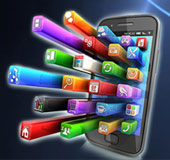Fan Engagement and Wearables: Disney MyMagic+
 A satisfying experience is the driver of any business’s revenue growth. Disney Theme Parks is no exception. Disney is executing a guest (and fan) personalization strategy leveraging wearables (and analytics) to track, measure and improve the overall park experience. The goal is increase sales, return visits, word of mouth recommendations, loyalty and brand engagement across channels, activities, and time.
A satisfying experience is the driver of any business’s revenue growth. Disney Theme Parks is no exception. Disney is executing a guest (and fan) personalization strategy leveraging wearables (and analytics) to track, measure and improve the overall park experience. The goal is increase sales, return visits, word of mouth recommendations, loyalty and brand engagement across channels, activities, and time.
Wearables are the next big thing. The new crop of gadgets — mostly worn on the wrist or as eyewear — will become a “fifth screen,” after TVs, PCs, smartphones, and tablets.
Wearables are already being used to monitoring vital signs, wellness and health. Devices like Fitbit, UP, Fuelband, Gear2 track activity, sleep quality, steps taken during the day. Consumers of all sorts — fitness buffs, dieters, and the elderly — have come to rely on them to capture and aggregate biometric data.
What most people don’t understand is how powerful wearables (coupled with analytics) can be in designing new user experiences. Businesses thrive when they engage customers by creating a longitudinal predictive view of each customer’s behavior. To understand the wearables use cases and potential we did a deep dive into a real-world application at Disney Theme Parks.
Wearable Computing at Disney: MyMagic+
Quantified Self, Ubiquitous Self Tracking = Wearable Analytics
 The future is here. It’s just not evenly distributed yet.” – William Gibson
The future is here. It’s just not evenly distributed yet.” – William Gibson
Self-tracking, Seamless Engagement and Personal Efficiency improvement’s new frontier is Personalized Big Data and Digital Health. This is really becoming a viable idea around wearable and sensor computing and the basis for new data platform wars.
The new platforms for digital life or data driven life — that collect, aggregate and disseminate — will cover a wide range of new User Experience (UX) use cases and end-points… medical devices, sensor-enable wristwear, headset/glasses, tech-sensitive clothing. All of them are going to collect a lot of data, low latency analytics, and enable data visualization. Several new firms are entering the activity tracker market LG (Life Band Touch), Sony (the Core), Garmin (Vivofit), Glassup, Pebble, JayBird Reign etc.
Data collection is just one piece of the solution. The foundation for personalized big data is Descriptive and Predictive Analytics. Ok…What do i next? what is the suggestion? in the form of predictive search (automated deduction or augmented reality).
How do i discover useful patterns, analyze, visualize, share, query and mobilize the collected data? A wide range of start-ups – Cue, reQall, Donna, Tempo AI, MindMeld, Evernote, Osito, and Dark Sky – and big companies like Apple, Google, Microsoft, LG and Samsung are working on predictive apps — aimed at enabling new robo-assistants that act as personal valets, anticipating what you need before you ask for it.







